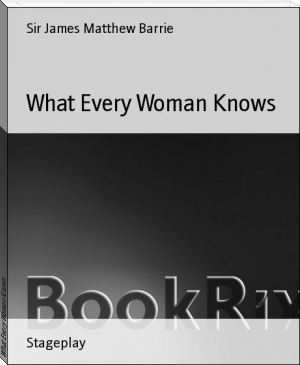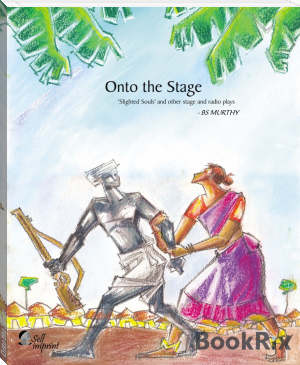Dear Brutus - Sir James Matthew Barrie (bill gates best books .TXT) 📗

- Author: Sir James Matthew Barrie
Book online «Dear Brutus - Sir James Matthew Barrie (bill gates best books .TXT) 📗». Author Sir James Matthew Barrie
ACT I
The scene is a darkened room, which the curtain reveals so stealthily that if there was a mouse on the stage it is there still. Our object is to catch our two chief characters unawares; they are Darkness and Light.
The room is so obscure as to be invisible, but at the back of the obscurity are French windows, through which is seen Lob's garden bathed in moon-shine. The Darkness and Light, which this room and garden represent, are very still, but we should feel that it is only the pause in which old enemies regard each other before they come to the grip. The moonshine stealing about among the flowers, to give them their last instructions, has left a smile upon them, but it is a smile with a menace in it for the dwellers in darkness. What we expect to see next is the moonshine slowly pushing the windows open, so that it may whisper to a confederate in the house, whose name is Lob. But though we may be sure that this was about to happen it does not happen; a stir among the dwellers in darkness prevents it.
These unsuspecting ones are in the dining-room, and as a communicating door opens we hear them at play. Several tenebrious shades appear in the lighted doorway and hesitate on the two steps that lead down into the unlit room. The fanciful among us may conceive a rustle at the same moment among the flowers. The engagement has begun, though not in the way we had intended.
VOICES.--
'Go on, Coady: lead the way.'
'Oh dear, I don't see why I should go first.'
'The nicest always goes first.'
'It is a strange house if I am the nicest.'
'It is a strange house.'
'Don't close the door; I can't see where the switch is.'
'Over here.'
They have been groping their way forward, blissfully unaware of how they shall be groping there again more terribly before the night is out. Some one finds a switch, and the room is illumined, with the effect that the garden seems to have drawn back a step as if worsted in the first encounter. But it is only waiting.
The apparently inoffensive chamber thus suddenly revealed is, for a bachelor's home, creditably like a charming country house drawing-room and abounds in the little feminine touches that are so often best applied by the hand of man. There is nothing in the room inimical to the ladies, unless it be the cut flowers which are from the garden and possibly in collusion with it. The fireplace may also be a little dubious. It has been hacked out of a thick wall which may have been there when the other walls were not, and is presumably the cavern where Lob, when alone, sits chatting to himself among the blue smoke. He is as much at home by this fire as any gnome that may be hiding among its shadows; but he is less familiar with the rest of the room, and when he sees it, as for instance on his lonely way to bed, he often stares long and hard at it before chuckling uncomfortably.
There are five ladies, and one only of them is elderly, the Mrs. Coade whom a voice in the darkness has already proclaimed the nicest. She is the nicest, though the voice was no good judge. Coady, as she is familiarly called and as her husband also is called, each having for many years been able to answer for the other, is a rounded old lady with a beaming smile that has accompanied her from childhood. If she lives to be a hundred she will pretend to the census man that she is only ninety-nine. She has no other vice that has not been smoothed out of existence by her placid life, and she has but one complaint against the male Coady, the rather odd one that he has long forgotten his first wife. Our Mrs. Coady never knew the first one but it is she alone who sometimes looks at the portrait of her and preserves in their home certain mementoes of her, such as a lock of brown hair, which the equally gentle male Coady must have treasured once but has now forgotten. The first wife had been slightly lame, and in their brief married life he had carried solicitously a rest for her foot, had got so accustomed to doing this, that after a quarter of a century with our Mrs. Coady he still finds footstools for her as if she were lame also. She has ceased to pucker her face over this, taking it as a kind little thoughtless attention, and indeed with the years has developed a friendly limp.
Of the other four ladies, all young and physically fair, two are married. Mrs. Dearth is tall, of smouldering eye and fierce desires, murky beasts lie in ambush in the labyrinths of her mind, she is a white-faced gypsy with a husky voice, most beautiful when she is sullen, and therefore frequently at her best. The other ladies when in conclave refer to her as The Dearth. Mrs. Purdie is a safer companion for the toddling kind of man. She is soft and pleading, and would seek what she wants by laying her head on the loved one's shoulder, while The Dearth might attain it with a pistol. A brighter spirit than either is Joanna Trout who, when her affections are not engaged, has a merry face and figure, but can dismiss them both at the important moment, which is at the word 'love.' Then Joanna quivers, her sense of humour ceases to beat and the dullest man may go ahead. There remains Lady Caroline Laney of the disdainful poise, lately from the enormously select school where they are taught to pronounce their r's as w's; nothing else seems to be taught, but for matrimonial success nothing else is necessary. Every woman who pronounces r as w will find a mate; it appeals to all that is chivalrous in man.
An old-fashioned gallantry induces us to accept from each of these ladies her own estimate of herself, and fortunately it is favourable in every case. This refers to their estimate of themselves up to the hour of ten on the evening on which we first meet them; the estimate may have changed temporarily by the time we part from them on the following morning. What their mirrors say to each of them is, A dear face, not classically perfect but abounding in that changing charm which is the best type of English womanhood; here is a woman who has seen and felt far more than her reticent nature readily betrays; she sometimes smiles, but behind that concession, controlling it in a manner hardly less than adorable, lurks the sigh called Knowledge; a strangely interesting face, mysterious; a line for her tombstone might be 'If I had been a man what adventures I could have had with her who lies here.'
Are these ladies then so very alike? They would all deny it, so we must take our own soundings. At this moment of their appearance in the drawing-room at least they are alike in having a common interest. No sooner has the dining-room door closed than purpose leaps to their eyes; oddly enough, the men having been got rid of, the drama begins.
ALICE DEARTH (the darkest spirit but the bravest). We must not waste a second. Our minds are made up, I think?
JOANNA. Now is the time.
MRS. COADE (at once delighted and appalled). Yes, now if at all; but should we?
ALICE. Certainly; and before the men come in.
MABEL PURDIE. You don't think we should wait for the men? They are as much in it as we are.
LADY CAROLINE (unlucky, as her opening remark is without a single r). Lob would be with them. If the thing is to be done at all it should be done now.
MRS. COADE. IS it quite fair to Lob? After all, he is our host.
JOANNA. Of course it isn't fair to him, but let's do it, Coady.
MRS. COADE. Yes, let's do it!
MABEL. Mrs. Dearth _is_ doing it.
ALICE (who is writing out a telegram). Of course I am. The men are not coming, are they?
JOANNA (reconnoitring). NO; your husband is having another glass of port.
ALICE. I am sure he is. One of you ring, please.
(The bold Joanna rings.)
MRS. COADE. Poor Matey!
LADY CAROLINE. He wichly desewves what he is about to get.
JOANNA. He is coming! Don't all stand huddled together like conspirators.
MRS. COADE. It is what we are!
(Swiftly they find seats, and are sunk thereon like ladies waiting languidly for their lords when the doomed butler appears. He is a man of brawn, who could cast any one of them forth for a wager; but we are about to connive at the triumph of mind over matter.)
ALICE (always at her best before "the bright face of danger"). Ah, Matey, I wish this telegram sent.
MATEY (a general favourite). Very good, ma'am. The village post office closed at eight, but if your message is important--
ALICE. It is; and you are so clever, Matey, I am sure that you can persuade them to oblige you.
MATEY (taking the telegram). I will see to it myself, ma'am; you can depend on its going.
(There comes a little gasp from COADY, which is the equivalent to dropping a stitch in needle-work.)
ALICE (who is THE DEARTH now). Thank you. Better read the telegram, Matey, to be sure that you can make it out. (MATEY reads it to himself, and he has never quite the same faith in woman again. THE DEARTH continues in a purring voice.) Read it aloud, Matey.
MATEY. Oh, ma'am!
ALICE (without the purr). Aloud.
(Thus encouraged he reads the fatal missive.)
MATEY. 'To Police Station, Great Cumney. Send officer first thing to-morrow morning to arrest Matey, butler, for theft of rings.'
ALICE. Yes, that is quite right.
MATEY. Ma'am! (But seeing that she has taken up a book, he turns to LADY CAROLINE.) My lady!
LADY CAROLINE (whose voice strikes colder than THE DEARTH'S). Should we not say how many wings?
ALICE. Yes, put in the number of rings, Matey.
(MATEY does not put in the number, but he produces three rings from unostentatious parts of his person and returns them without noticeable dignity to their various owners.)
MATEY (hopeful that the incident is now closed). May I tear up the telegram, ma'am?
ALICE. Certainly not.
LADY CAROLINE. I always said that this man was the culpwit. I am nevaw mistaken in faces, and I see bwoad awwows all over youws, Matey.
(He might reply that he sees w's all over hers, but it is no moment for repartee.)
MATEY. It is deeply regretted.
ALICE (darkly). I am sure it is.
JOANNA (who has seldom remained silent for so long). We may as well tell him now that it is not our rings we are worrying about. They have just been a means to an end, Matey.
(The stir among the ladies shows that they have arrived at the more interesting point.)
ALICE. Precisely. In other words that telegram is sent unless--
(MATEY'S head rises.)
JOANNA. Unless you can tell us





Comments (0)